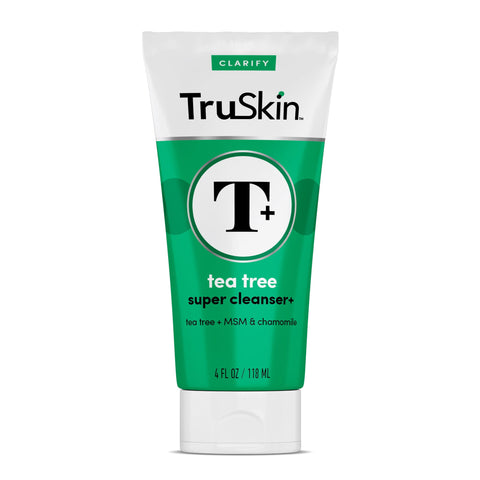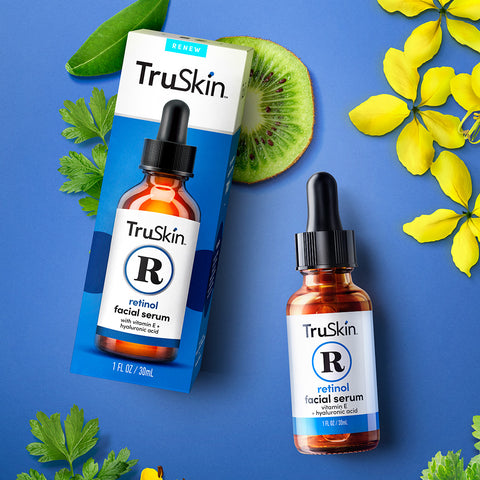
What Happens To Your Pores As You Age?
Do you feel like your already-supersized-pores are growing by the minute? They're not. But it might feel like they are...
Pores are the foundation of healthy skin. Of course, collagen makes your skin strong, supple and plump. And yes, elastin gives it that all-important bouncebackability. But without pores, your skin would be a dry, shrivelled up shadow of its former self. Not to mention the fact that your entire body would lose its ability to regulate its own body temperature.
As a quick reminder, pores are tiny, microscopic openings found at the surface of your skin right at the top of your hair follicles and sweat glands. They exist to allow important liquids (as well as other particles and gases) to pass through the surface of your skin. The human body has two types of pores: sweat pores which help regulate body temperature; and oil-producing pores that are found at the top of your hair follicles where they release sebum to moisturize and lubricate the surface of the skin. The good thing about sweat pores is that they’re so small you can’t see them making them of very little concern in the grand scheme of things.
Oil-producing pores, on the other hand, are just so annoyingly visible. So why?
What Determines The Size Of Your Pores?
Like your height, skin tone and color of your hair, the size of your pores is largely shaped by genetics. This means that yes, you can blame your parents, and yes, the size of your pores is pretty much fixed.
Of course, this is great news if you have almost invisible pores. Not so much if yours feel like they take over your entire face. But let’s get one thing straight: no matter how enlarged you believe your pores are when you study them in the mirror, they’re rarely as bad as you think. Because the truth is, nobody else scrutinizes your skin on the same level as do you.
Do Pores Get Bigger Over Time?
Yes and no. The size of your pores never really changes on a physiological level. So yes, all those half-truths about being able to ‘shrink’ your pores with alcohol-heavy toners or freezing cold water is a bit of a con. But there’s a little bit of truth in there because while the actual size of your pores doesn’t alter, their walls can stretch and expand, making them appear more pronounced.
Penny drops.
What Causes Pores To Stretch With Age?
Many things happen to your skin throughout your life that can cause the walls of your pores to become damaged and loose. Of course, regular aging plays the most obvious role as your collagen levels naturally decrease over time. Sadly, there’s not a huge amount you can do about your biological clock (there’s those genes doing their worst again!) but there are many other factors of which you can control that contribute to the rate at which your pores become slack.
Sun Damage
Gosh, the sun gets blamed for a lot of skin issues. But we don’t apologize for that because it really is one of the worst things for the condition of your skin. UV radiation breaks down important proteins like collagen and elastin thanks to a build-up of free radicals. This weakens the collagen fibers that give your skin its structure, thus allowing the walls of your pores to become slack, weak and kind of baggy-looking. AKA more visible!
Picking Your Skin
If you have a tendency to pick or squeeze your skin, this not only irritates your skin as a whole, but it can seriously mess with the collagen and elastin fibers that keep your skin firm and supple. Scarring is the most obvious possibility from picking your skin, but you pores will also suffer as a consequence.
Excess Sebum
After puberty sebum production usually levels out to a somewhat more ‘normal’ rate. However, things can get messy again during significant hormonal changes in your life. Menstruation, pregnancy, the menopause, all of these periods in your life cause your hormones to become unbalanced and your sebum levels to fluctuate. And when sebum production increases it fills up your pores causing them to expand, stretch and appear bigger.
Slow Cell Turnover
When you’re in your 20s each skin cell has a life cycle of around 28 days in which time it is formed at the lower levels, moves up to the surface and then sheds. As with most biological functions, however, cell turnover slows down as you mature, causing dead cells to hang around longer than necessary at the surface of your skin. Like excess sebum, these dead cells have nowhere else to go but to clog up your pores. And clogged pores = saggy, enlarged-looking pores.
Bad Makeup Choices
Certain foundations and face cosmetics that contain heavy oils and thick butters can also block your pores, causing them to expand and become more noticeable. Make sure you scan the labels of your favorite makeup formulations to ensure they’re non-comedogenic. Non-comedogenic means they’re way less likely to block your pores (comedone is the fancy term for pore, if you didn’t know).
The Best Ways To Keep Your Pores Tight
After reading the above you can probably guess what you need to do to avoid your pores becoming damaged and saggy. But we’ll lay it out for you anyway, just to drive the point home!
1. First up, wear sunscreen. This is the best thing you can do to conserve the collagen you’ve already got while ensuring you’re still making quality fresh stuff. Apply SPF 30 Mineral Sunscreen with Vitamin C every morning as par for the course, and do your skin even more of a solid by doubling up your protection with an antioxidant serum underneath sunscreen. Niacinamide is a very good ingredient for smoother, more resilient skin so try our Niacinamide (B3) Facial Serum.
2. Don’t pick your skin. Pimples or no pimples. Nothing good can come of this.
3. Balance sebum by gently cleansing and lightly moisturizing your skin come what may. It’s super important to keep your skin clean morning and night so that oils don’t build up at the surface. We love Tea Tree Super Cleanser+ which harnesses the power of tea tree oil to clarify the skin without leaving it feeling parched. Just remember, it’s equally as vital to follow with moisturizer so your skin doesn’t think it’s dry and overcompensate with more oil than you started with!
4. Exfoliate to boost cellular turnover. But don’t overdo it. Listen to your skin and exfoliate just once or twice a week if that’s all it needs. Our Vitamin C Gentle Face Scrub (which just won an industry award may we add!) is a fantastic way to keep your skin bright, clean and dead skin cell-free. Plus, it’s kind to your skin. Which is super important, at any age.
5. Finally, don't underestimate the powers of retinol. Retinol is an incredible way to boost collagen AND encourage healthy cellular turnover. That's great news for your pores. And for controlling acne. And for reducing the appearance of wrinkles. And... well, you get the picture. Try our classic Retinol Facial Serum once or twice a week to begin with, building up to nightly as your skin acclimates.

















